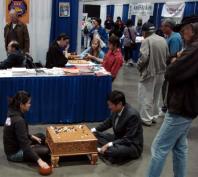 WS
CROWD AT L.A. JAPAN EXPO: “The Japan Expo
event was a blast,” reports local organizer Andrew Okun.
“Jonathan Brown and Akasha Yi brought a
floor goban which consistently attracted spectators throughout the
two-day show December 1-2 at the Los Angeles Convention
Center.” Volunteers Brown, Yi, Joe Cepiel, Richard Dolen,
David Dows, Joe Walters,
Dammy Osoba, Norman Tsai, Bowen Sanders, Dan Choy and Laurel Sanders
taught several dozen people how to play
and exposed many other folks to the game for the first time.
“Still others, who’ve played in the past,
reacquainted themselves with the game and heard about the AGA and
upcoming go activities,” Okun adds. In addition to the
volunteers above, Okun thanked “longtime go promoter Bob
Terry, who arranged for the booth, and our booth sponsor,
Sushi & Sake Magazine and its head of sales, David
Kudo.” Gary Shen 5d
(r), and his daughter Cherry 6d (l), play on a goban while Joe Walters,
Richard Dolen and Jonathan Brown teach in the background. Photo by
Andrew Okun
WS
CROWD AT L.A. JAPAN EXPO: “The Japan Expo
event was a blast,” reports local organizer Andrew Okun.
“Jonathan Brown and Akasha Yi brought a
floor goban which consistently attracted spectators throughout the
two-day show December 1-2 at the Los Angeles Convention
Center.” Volunteers Brown, Yi, Joe Cepiel, Richard Dolen,
David Dows, Joe Walters,
Dammy Osoba, Norman Tsai, Bowen Sanders, Dan Choy and Laurel Sanders
taught several dozen people how to play
and exposed many other folks to the game for the first time.
“Still others, who’ve played in the past,
reacquainted themselves with the game and heard about the AGA and
upcoming go activities,” Okun adds. In addition to the
volunteers above, Okun thanked “longtime go promoter Bob
Terry, who arranged for the booth, and our booth sponsor,
Sushi & Sake Magazine and its head of sales, David
Kudo.” Gary Shen 5d
(r), and his daughter Cherry 6d (l), play on a goban while Joe Walters,
Richard Dolen and Jonathan Brown teach in the background. Photo by
Andrew Okun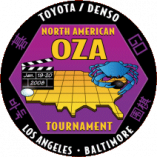
N.A. OZA LURES TOP PLAYERS: Bi Jang 8d, the former Korean insei who’s visiting and teaching in Seattle – and who’s now undefeated in three U.S. tournaments – looks to be the odds-on favorite for the $3,000 top prize thus far in the L.A Oza in January, while Yuan Zhou 8d and Jie Liang 8d are the strongest registrants to date in Baltimore, where there’s also a $3,000 top prize. Twenty players have already signed up for L.A and 33 for Baltimore, though organizer Keith Arnold warns that “the discount rate for a limited number of hotel rooms at the East Coast site expires on 12/18 - so make your reservations now!" With a prize pool for both locations of more than $25,000, the bi-annual tournaments are expected to draw some of the biggest and strongest fields of the year; top boards at both venues will be broadcast live on KGS.
6 YOUTH CHAMPIONSHIP VENUES CONFIRMED: Six venues from Hawaii to New Jersey have now been confirmed for the 2008 U.S. Youth Go Championships, reports Nicole Casanta. “We’re still looking for two more hosting sites,” says Casanta. The confirmed sites include Tacoma, WA, Hawaii, Boulder, CO, New Jersey, Newton, MA and San Francisco, CA. Dates and more details will be available soon. To find out more about hosting a Youth Championship, email Nicole Casanta and nicole@seraphine.us
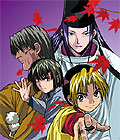
HIKARU BOOSTS TEAM CHAMPIONSHIPS: The new Ing School Team Championship is getting a helping hand from Hikaru himself this week. The January issue of Shonen Jump, which hits newsstands on Tuesday, features a full-page article on the tournament. Janice Kim, 3P, author of the "Getting Go" column tells readers about Mr. Ing, the new tournament, and the American Go Foundation's offer of free equipment to any school that wants to start a program. With a circulation of 1.9 million, almost all of them school-aged, the article is sure to bring many new kids into the AGA. The American Go Honor Society has also announced that they will allow kids who don't have enough members for a team to compete under the Libero Rule. Players that wish to compete, but have no local school team, may submit their name as a libero player, and be placed on a team based on location, as assigned by the tournament staff. The tournament committee will randomly place them on a team requiring an additional player, or will create a new team composed completely of libero players to compete in the event. Click here for more information on the tournament, and to register.
- reported by Paul Barchilon, EJ Youth Editor
YEARBOOK AD DEADLINE APPROACHING: Advertising space in the forthcoming 2007 American Go Yearbook is now available. This popular collection of the "best of" the American Go E-Journal features over 100 pages of material and the 2007 Yearbook promises to be our best yet, as we sort through a record amount of terrific material from our expanded coverage of go around the world this year. Ads are $200 per page, $100 half-page, $50 quarter-page. Deadline for reserving space is December 15; email journal@usgo.org
STOCKING STUFFERS: “Kiseido is having a Christmas sale of high-quality go equipment,” Richard Bozulich tells the EJ. Get 20% off on kaya table boards, shell and slate stones, and go bowls. Click here for details.
AHN CHOYEONG 9P WINS COUPON GO TOURNEY: Ahn Choyeong 9P won the November 28-29 Coupon Go (11/26 EJ) Tournament in Korea. The event was “a great success,” reports founder and organizer Elwyn Berlekamp, who tells the EJ that “The president of the Korean Baduk Association participated in the opening ceremonies.” The players were Jujo Jiang 9P, Rui Naiwei 9P, Ahn Choyeong 9P, Weon Seongchin 8P, Song Taekon 8P, and rising star Han Sanghoon 1P. All the games were originally played by Go Seigen, and “Having the same game start at all the tables reduced the luck factor and made for both interesting and instructive comparisons,” adds Bill Spight. Ahn won with a score of 3 1/2, tieing with Song and losing only to Han in a game broadcast on Baduk TV. Ahn is known for his endgame skill and has been called "half point Ahn" because of his close wins. Weon was second with a score of 3, losing to Ahn and Song. Rui and Song tied for third and fourth with scores of 2 1/2.
CALENDAR: 5 Events Coast to Coast!
December 8-9: Seattle, WA: Yilun Yang Workshop
Andrew Gross andrew.b.gross@gmail.com 206.852.3673
December 8: Sacramento, CA: Davis/Sacramento Winter Quarterly
Arcade Library in Sacramento, Reg. 9am, Play 10 am, 4 rounds
Willard Haynes willard@saclink.csus.edu 916.929.6112
December 8: Chicago, IL: Break On Through
Including First Chicago Pair Go Tournament
Bob Barber komoku@earthlink.net 773.467.0423
December 8: Amherst, MA: Western Mass Go Winter Tournament
U.Mass Grad.Tower 16th fl Math lounge
Micah Feldman myfeldman@yahoo.com 4135873728.5308040
December 9: Cincinnati, OH: Cincinnati Winter Open
Join us at Clifton Comics and Games for a Self Paired Handicap Tournament!
Mike LaBarbera CincyGoClub@gmail.com 513.861.5071

JAPAN HANGS ON IN NONGSHIM: Takao Shinji 9P (r) is the last Japanese player remaining after the first two rounds of the international Nongshim Cup, a team tournament between China, Japan, and Korea. China still has Chang Hao 9P, a former pupil of Yilun Yang 7P who eliminated Yoda Norimoto 9P of Japan by 6.5 points on December 1st, and Gu Li 9P. Korea still has Park Yeonghun 9P and Lee Changho 9P, who has only been defeated once in the eight editions of this event; in 2006 Yoda won it for Japan by beating Lee. The final round doesn't occur until February 2008, when Chang will start it off by playing Takao. In the first ten games, the Japanese only won twice, both times by a half-point, and four of the ten games played so far have involved half-point margins. Hane Naoki 9P started things off by beating Peng Quan 7P of China and Yamada Kimio 9P won a game in the second round by defeating Wang Xi 9P of China.
 YAMASHITA
KEEPS OZA TITLE: Yamashita
Keigo 9P defeated challenger
Imamura Toshiya 9P by a score of 3-1 to hold on to the Japanese
Oza title for a second year. Yamashita has also held the Kisei
title for two years now. He won the Gosei
in 2000 and the Tengen
in 2004 and was also the challenger for the Judan
the last two times, losing to Cho
Chikun 9P in both cases. Imamura, who is a member of the
Kansai Kiin, has never won a title, although he did challenge for the
Gosei in 1989, losing to Kobayashi
Koichi 9P.
YAMASHITA
KEEPS OZA TITLE: Yamashita
Keigo 9P defeated challenger
Imamura Toshiya 9P by a score of 3-1 to hold on to the Japanese
Oza title for a second year. Yamashita has also held the Kisei
title for two years now. He won the Gosei
in 2000 and the Tengen
in 2004 and was also the challenger for the Judan
the last two times, losing to Cho
Chikun 9P in both cases. Imamura, who is a member of the
Kansai Kiin, has never won a title, although he did challenge for the
Gosei in 1989, losing to Kobayashi
Koichi 9P.CHABOT-HALLE SWEEPS OTTAWA EMBASSY CUP: Dominique Chabot-Halle 4d swept the 2007 Japanese Embassy Cup on November 18 in Ottawa, Ontario, Canada, defeating runner-up Phil Waldron 6d to top the 46-player field. Patrick Lung 5d won special prizes for most improved, going from 10 kyu in 2004 to 5 dan in 2007, and for being the player who came the furthest, arriving from Toronto. Anna Blinder won a prize as “the keenest player who self-taught in June 2007 and is now 15k” as well as for promoting go to her friends. And 6-year-old 10 kyu Kevin Wan won a special prize as the youngest player, who’s only been playing since last summer. WINNER’S REPORT: A Group: 1st: CHABOT-HALLE, Dominique 4d; 2nd: WALDRON, Phil 6d. B Group: 1st: WANG, King 3d; GAUVIN-ST.DENIS, Blaise 3d. C Group: 1st: PENG, You-Qing 3d; 2nd: LAI, Benson 2d. D Group: 1st: CHEN, Zhong 1d; 2nd: LAI, Long-Li 4k. E Group: 1st: AIDA, Harumitsu 6k; 2nd: SHAPIRO, Tom 5k. F Group: 1st: WANG, Adam 15k; 2nd: CHEN,
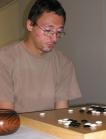 Ti-Yang
10k.
Ti-Yang
10k.- reported by Charles Chang
POP WINS ROMANIAN AMBASSADOR CUP: Cristian Pop 7d (l) won the Ambassador Cup, held in Bucharest, Romania December 1-2. A field of 139 players participated in the first-ever event, organized by the Romanian Go Federation and Saijo Association at the invitation of His Excellency Kanji Tsushima, the Japanese Ambassador to Romania. Cornel Burzo 6d took 2nd place and Mirel Florescu 6d was 3rd.
- reported by Marilena Bara, Romanian Correspondent for the E-Journal.
MIND SPORT GAMES: Cognitive "Doping" In Mind Sports
By Dr. Roy Laird
As we prepare for the Mind Sport Games
 next
October in Beijing, one interesting step on the path to the next level
involves the question of cognitive "doping." The periodic downfall of
athletes such as Marion
Jones reminds us that "doping" scandals are common in the
world of athletic sports; less widely known is that similar threats are
thought to exist in the world of mind sports. In 2005, The
Washington Times discussed an array of "cognitive enhancers"
and the implications. The International Go Federation has adopted the
FIDE Anti-Doping
Policy, and will be implementing its provisions. FIDE's
policy has been in effect since it was first implemented at the 35th
Chess Olympiad in Slovenia in 2002. While most drugs used by
athletes like Jones have little or no legitimate medical use, cognitive
boosters can be used to treat various medical conditions and in some
instances, the cognitive benefit is a side effect.
Ritalin and other stimulants have been
called "psychiatry's answer to steroids" and students sometimes use
them to boost performance on important exams like the SAT. So-called
"beta blockers" help performers who suffer from performance anxiety.
Modalifinil, used to treat narcolepsy, boosts memory. Donepzil, an
Alzheimer's drug, seems to help concentration and alertness. In the
chess world, some players object
to the new rules, claiming a lack of evidence that better alertness,
concentration and memory actually enhance cognitive performance.
Putting better gas in your car, they say, won't make it run any better.
Cognitive stimulants like coffee are in
common public use and banning coffee from the playing area might seem
ridiculous, but in fact the FIDE policy forbids blood levels of more
than 12 mcg/ml of caffeine. Despite these questions, one thing is
certain -- as Mind Sports take their place under the umbrella of the
Olympic movement, questions of cognitive "doping" will need to be
addressed.
next
October in Beijing, one interesting step on the path to the next level
involves the question of cognitive "doping." The periodic downfall of
athletes such as Marion
Jones reminds us that "doping" scandals are common in the
world of athletic sports; less widely known is that similar threats are
thought to exist in the world of mind sports. In 2005, The
Washington Times discussed an array of "cognitive enhancers"
and the implications. The International Go Federation has adopted the
FIDE Anti-Doping
Policy, and will be implementing its provisions. FIDE's
policy has been in effect since it was first implemented at the 35th
Chess Olympiad in Slovenia in 2002. While most drugs used by
athletes like Jones have little or no legitimate medical use, cognitive
boosters can be used to treat various medical conditions and in some
instances, the cognitive benefit is a side effect.
Ritalin and other stimulants have been
called "psychiatry's answer to steroids" and students sometimes use
them to boost performance on important exams like the SAT. So-called
"beta blockers" help performers who suffer from performance anxiety.
Modalifinil, used to treat narcolepsy, boosts memory. Donepzil, an
Alzheimer's drug, seems to help concentration and alertness. In the
chess world, some players object
to the new rules, claiming a lack of evidence that better alertness,
concentration and memory actually enhance cognitive performance.
Putting better gas in your car, they say, won't make it run any better.
Cognitive stimulants like coffee are in
common public use and banning coffee from the playing area might seem
ridiculous, but in fact the FIDE policy forbids blood levels of more
than 12 mcg/ml of caffeine. Despite these questions, one thing is
certain -- as Mind Sports take their place under the umbrella of the
Olympic movement, questions of cognitive "doping" will need to be
addressed.Laird, Chairman of the AGA Board of Directors, holds a Ph.D. in clinical social work and directs a mental health clinic in a public school, where "performance-enhancing" medications are often prescribed as part of the treatment for ADHD and other disorders.
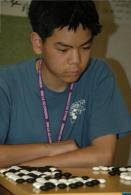
GO QUIZ: Only three out of 12 came up with a very young Eric Lui as the cover star of Chris Garlock's first print Journal as editor. Yes, Redmond (6), Jujo (2) and Kim (1) were all amongst the early covers. And only one of you, Jim Hlavka, earned the bonus credit for naming the photographer - what was his name again, oh, that’s right, Keith Arnold. I would like to thank all 245 of you who participated in the Go Quiz this year, along with everyone who took part in some of our polls. I hope you have enjoyed it as much as I have. Phil Waldron (despite a slip-up this week) is this year’s champ, with most correct and the only person to have answered every quiz. Grant Kerr is second, with his perfect record, and Kim Salamony gets third place. All three will receive go vendor gift certificates in recognition of their achievement. The final tally: Waldron 30/36, Salamony 28/33, Kerr 17/17, Terry Fung 10/10, Daniel Denis 10/11, Richard Hayes 10/13, Ramon Mercado 9/10, Peter Schumer 7/8, Garreth Williams 7/11, Trevor Morris 7/17. Thanks to everyone who participated at least 7 times - Shai Simonson, Steve Fawthrop, Matt Jones, David Hawly, Bob Felice, Karen Jordan, Zeke Tamayo and Austin Robinson. Watch for the return of the Quiz in January ’08! Photo: Chris Garlock
- Quizmaster Keith Arnold, HKA
KERWIN'S ROAD MAP FOR BEGINNERS: Part 7: What to do about your opponent’s weak stones
by James Kerwin 1P
During a game of go, both sides have weak groups at various times. These groups represent a liability to the ‘owner’ and an asset to the other player. A major skill in go is finding ways to benefit from this asset. If you can kill the weak group, that could be a big profit, of course. But the first thing to understand about weak groups is that even though they are weak they are hard to kill. The second thing to understand is that even if you kill them you may not profit because the opponent may well be able to engineer a trade and take one of your own groups in exchange.
So how do you benefit from your opponent’s weak groups? By finding moves which simultaneously threaten the weak group and create a gain for you. The opponent must answer your threatening moves or lose the group and cannot prevent you from getting your gain. This strategy is called attack.
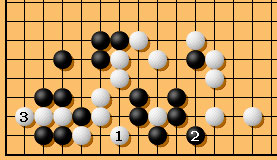 Diagram 1 shows a good example of an attack.
White 1 threatens to kill black. Black must play 2 to live, but White 3
takes the corner. In this case the benefit is territory.
Diagram 1 shows a good example of an attack.
White 1 threatens to kill black. Black must play 2 to live, but White 3
takes the corner. In this case the benefit is territory. Let me digress for a moment. Attacking is not fighting. What’s the difference? Fighting is contending with the opponent over the local division of spoils. Attacking is using threats against weak groups to create gains elsewhere, not necessarily locally. These gains could be territory, or power/influence, or an attack on another group.
The key to attacking is to start by choosing where and what you want to gain. You will find it difficult at first to see a possible gain and how to use attack to get it. The good news is that if you can’t see how to use the weak group to get what you want, you can afford to wait. The worst case is that the opponent will eventually spend a move to reinforce the group allowing you to play a profit move, so you’re guaranteed something.
This is just an overview of attacking: it will be a long, long time before you can plan and execute an attack confidently. But if you look for ways to benefit from your opponent’s weak groups you will improve.
Kerwin, a longtime go teacher, is a regular contributor to the E-Journal and American Go Yearbook. If you have questions on the material in this column, or on how to get stronger, email him at journal@usgo.org
CAN'T STOP THE MONKEY JUMP: Go for Couples
by Motoko Arai
In the past, my husband and I have played countless games of go together. Based on that experience, I’ve come to the conclusion that it’s generally better that couples don’t play together. What I mean is, somehow, it seems there’s always a good chance it will end up in a quarrel. I don’t think the problem lies in winning or losing.
Over the years, we’ve played Mah Jong and poker together too, and each of us has lost many times over. For a while, on our family trips we played a game known as “The Diamond Game” all the time, and it got so that even before we had started out on our trip we’d get excited about the time we could spend playing the Diamond Game. Still, we never fought during one of these games. It goes without saying, but my husband and I are adults, so if one of us loses at the Diamond Game or poker (sure, it’s a little annoying to lose and all, but...) we don’t get angry or have a quarrel over it.
So then, why is it that we only quarrel when we play go?
For whoever loses, it’s really depressing. And annoying. Still, this is the same situation when we lose at the Diamond Game, and in that game, however annoying it might be to lose we just grin and bear it, right? So then why is it different with go?
I guess you can kind of understand why the loser doesn’t get too annoyed or angry about losing at Mah Jong or poker. In these games, one of the biggest problems is what kind of hand you are dealt initially. I mean, luck plays a big role in games like these. (Of course, there are strong poker players and strong Mah Jong players. There’s much more than just luck to the game, but it can’t be denied that luck plays a definite role.)
On this point, go is different: there is no room for luck to enter in. I feel like this factor alone is enough to explain why sometimes we quarrel over go. But it’s not like we’re little kids or something, where when one player loses he/she immediately throws a temper tantrum or tries to start a fight. (After all, we never fight over the Diamond Game.)
Perhaps the root of the problem in go is what I might call a "War of Analysis." In the case of go, once the game is finished, there is almost guaranteed to be such a war. The losing side regrets some move or moves that he was forced to make, and little by little the winning side begins to feel convinced that, hey, in some moves she really played quite a bit better. Then she says those things out loud.
Of course, when you play with other people this kind of post-game war doesn't happen. (Or rather, it might happen but it never escalates to the point where it becomes a problem.) But when a couple plays go together, these feelings of regret and superiority can quickly escalate beyond the game and into a kind of lover's spat.
And there you have it. There are plenty of couples out there who - to avoid fighting over games - don't play go together. Which really is a shame, since they share the same hobby and everything. (Having written that, for the sake of peace and quiet at home, I don't think my husband and I will be playing go together anymore either.)
Motoko Arai is an award-winning science fiction author in Japan. Translated by Chris Donner from the Nihon Kiin's Go Weekly (February 5, 2007 issue)
GO CLASSIFIED
SELL IT, BUY IT OR TRADE IT HERE with over 11,000 go-players worldwide! Classified ads are FREE and run for 4 weeks; email your ad to us now at journal@usgo.org Locate go clubs worldwide
GO BOARDS WANTED: Looking for a decent go board; not homemade, warped or abused (dinged or scratches OK). Need bowls too. Also seeking one 13x13/19x19 reversible board. Contact gkoewing@ gmail.com (12/3/07)
GO PLAYERS WANTED: Mooresville, NC area. New club trying to start up. Playing on Sundays at Gamers University in Mooresville. Email Angela: a_e_blackwell@hotmail.com (11/26)
GO PROFESSOR WANTED: The Department of Baduk Studies at the Myongji University of Korea is looking for a Contract Professor. Must be a M.D. holder in the fields related to Baduk; responsibilities include lectures in English and lectures related to Baduk. For more info email Kim Se Young at gnuoyes@hotmail.com (11/26)
JAPAN EXPO GO VOLUNTEERS NEEDED: Southern California go players are needed to help staff a go booth at the Japan Expo at the LA Convention Center Dec. 1 and 2. Help introduce hundreds of people to the game, while enjoying a few games or a lesson from stronger players and checking out the rest of the Expo. Contact Andy at abc@okun.name if you would like to help staff the booth, or see http://www.japanexpo.org/index.html if you just want to come along. (11/19)
RANK CERTIFICATE PROGRAM MANAGER WANTED: The American Go Association is looking for a detail oriented person to manage the new AGA rank
certificate program. This person will work closely with the rating and database coordinators to notify people eligible for rank certificates, answer questions, and send certificates to those who request them. There will probably be a bit of a flood at first, but then it will settle down to a moderate trickle. Anyone interested please respond to operations@usgo.org (11/19)
ONLINE TDS SOUGHT: The AGA is looking for volunteer online tournament directors and assistants for several upcoming online events, including some of the US qualifiers for the World Mind Sport Games (http://www.usgo.org/WMSG08.html ), as well as other annual events such as the North American Fujitsu Qualifier. Prior tournament directing experience, familiarity with pairing methods ( http://senseis.xmp.net/?TournamentPairing ) and programs (PyTD, WinTD, etc.) is preferred but not necessary. Must have great computer and communication skills. More information will be provided to help guide you in becoming a valued resource for the AGA as online tournament directors and assistants. Respond to tournaments@usgo.org if you are interested. Include your AGA number, current rating, and prior experience (if any). (11/19)
GO PLAYERS WANTED… in Northern Virginia. All skill levels and ages welcome. The Tysons Corner Go Club meets every Saturday 9:30 – 12:30. Contact Ching-Sung Chin: chin8673@yahoo.com for more details (11/5)
GO Players Wanted: North Wales (central Montgomery County) PA. This informal group meets every Sunday afternoon. We are in the Borders store in Airport Square, Rts 309 and 202. Please contact nlzod@comcast.net
GO TEACHER WANTED: Canton, MA: Sharon Chinese School (www.sharoncs.org) needs a go teacher. Time: 3:30-5P every Saturday except holidays. Location: 900 Washington St., Canton, MA 02021 Contact: (781) 690-2066 (11/12)
GO PLAYERS WANTED: Baltimore, MD: Go players wanted in northern Baltimore, MD. The Lake Walker Go Club (an official AGA chapter) meets every Monday night at 8. Contact Jim Pickett: j.m.pickett@att.net (11/5)
Published by the American Go Association
Managing Editor: Chris Garlock
Assistant Editor: Bill Cobb
Text material published in the AMERICAN GO E JOURNAL may be reproduced by any recipient: please credit the AGEJ as the source. PLEASE NOTE that commented game record files MAY NOT BE published, re-distributed, or made available on the web without the explicit written permission of the Editor of the E-Journal. Please direct inquiries to journal@usgo.org
Articles appearing in the E-Journal represent the opinions of the authors and do not necessarily reflect the official views of the
American Go Association.